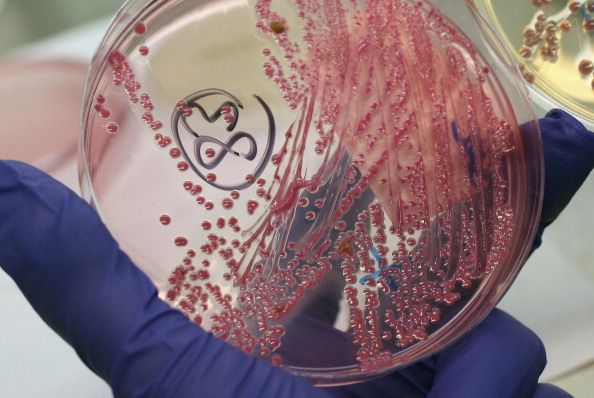Superbug resistant to last-resort antibiotic found for the first time in U.S.


A free daily email with the biggest news stories of the day – and the best features from TheWeek.com
You are now subscribed
Your newsletter sign-up was successful
For the first time in the United States, a person has been diagnosed with a superbug that can't be treated by a last-ditch antibiotic.
As described in a study published Thursday in Antimicrobial Agents and Chemotherapy, a 49-year-old woman went to a military clinic in Pennsylvania with symptoms of a urinary tract infection, and when her sample was sent to a lab, it was determined the E. coli bacteria that caused her infection was resistant to colistin, an antibiotic used as a last resort. Bacteria can become resistant to antibiotics due to overuse of antibiotics in medicine and food production, and in April, the Centers for Disease Control and Prevention announced one in three antibiotic prescriptions is unnecessary. "We risk being in a post-antibiotic world," CDC Director Thomas Frieden told USA Today. "The medicine cabinet is empty for some patients."
Doctors say this woman's diagnosis is noteworthy because she has not traveled outside of the United States. Sen. Michael Bennet (D-Colo.) and Sen. Orrin Hatch (R-Utah) have been working on legislation to make the approval of new antibiotics go faster, and in a statement, Bennet said the news out of Pennsylvania is "terrifying," adding, "we need new drugs to fight these antibiotic-resistant bacteria that pose serious and unique challenges to health care professionals."
The Week
Escape your echo chamber. Get the facts behind the news, plus analysis from multiple perspectives.

Sign up for The Week's Free Newsletters
From our morning news briefing to a weekly Good News Newsletter, get the best of The Week delivered directly to your inbox.
From our morning news briefing to a weekly Good News Newsletter, get the best of The Week delivered directly to your inbox.
Update 1:15 p.m.: The U.S. has seen its first case of bacteria resistant to a last-resort antibiotic — not, as it had previously been reported, to all antibiotics. This post has been updated to reflect the change.
A free daily email with the biggest news stories of the day – and the best features from TheWeek.com
Catherine Garcia has worked as a senior writer at The Week since 2014. Her writing and reporting have appeared in Entertainment Weekly, The New York Times, Wirecutter, NBC News and "The Book of Jezebel," among others. She's a graduate of the University of Redlands and the Columbia University Graduate School of Journalism.
-
 The Olympic timekeepers keeping the Games on track
The Olympic timekeepers keeping the Games on trackUnder the Radar Swiss watchmaking giant Omega has been at the finish line of every Olympic Games for nearly 100 years
-
 Will increasing tensions with Iran boil over into war?
Will increasing tensions with Iran boil over into war?Today’s Big Question President Donald Trump has recently been threatening the country
-
 Corruption: The spy sheikh and the president
Corruption: The spy sheikh and the presidentFeature Trump is at the center of another scandal
-
 Nobody seems surprised Wagner's Prigozhin died under suspicious circumstances
Nobody seems surprised Wagner's Prigozhin died under suspicious circumstancesSpeed Read
-
 Western mountain climbers allegedly left Pakistani porter to die on K2
Western mountain climbers allegedly left Pakistani porter to die on K2Speed Read
-
 'Circular saw blades' divide controversial Rio Grande buoys installed by Texas governor
'Circular saw blades' divide controversial Rio Grande buoys installed by Texas governorSpeed Read
-
 Los Angeles city workers stage 1-day walkout over labor conditions
Los Angeles city workers stage 1-day walkout over labor conditionsSpeed Read
-
 Mega Millions jackpot climbs to an estimated $1.55 billion
Mega Millions jackpot climbs to an estimated $1.55 billionSpeed Read
-
 Bangladesh dealing with worst dengue fever outbreak on record
Bangladesh dealing with worst dengue fever outbreak on recordSpeed Read
-
 Glacial outburst flooding in Juneau destroys homes
Glacial outburst flooding in Juneau destroys homesSpeed Read
-
 Scotland seeking 'monster hunters' to search for fabled Loch Ness creature
Scotland seeking 'monster hunters' to search for fabled Loch Ness creatureSpeed Read
